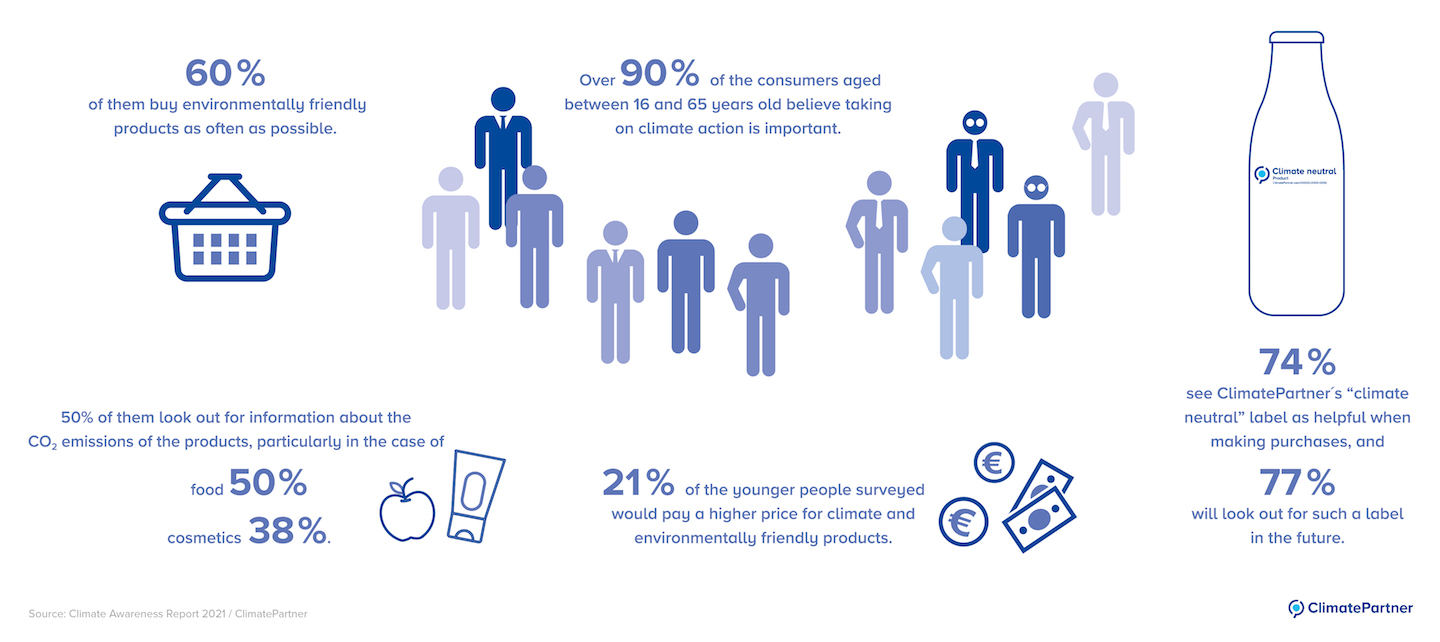 Majority of consumers welcome carbon labels as a decision-making tool when shopping
Majority of consumers welcome carbon labels as a decision-making tool when shopping
Consumers are increasingly thinking about how their personal consumption can support climate action. In this context, labels that inform consumers about the CO2 emissions or the carbon neutrality of a product serve as important decision-making tools. This is the result of a representative survey conducted as part of the Climate Awareness Report 2021, which ClimatePartner is presenting for the first time.
On behalf of ClimatePartner, the market research institute Appinio surveyed more than one thousand consumers between the ages of 16 and 65 in central Europe about their attitude towards climate action. According to the survey, the willingness to make a contribution to climate action through their purchasing decisions is very high:
• Over 90 % of consumers believe contributing to climate action is fundamentally important.
• 50% already pay attention to information on the CO2 emissions of products, especially in the cases of food and cosmetics.
• Over 60% buy only environmentally friendly products, or try to do so as much as possible.
• 21% of the younger respondents (aged 16-25)_are willing to pay higher prices for environmentally friendly products.
• 74% see the "climate neutral" label from ClimatePartner as a useful decision-making tool when shopping.
• 77% would actively look for such a label when shopping in the future.
Taking on climate action when shopping
The survey also shows that the majority of respondents already has a basic understanding about the principle of carbon neutrality or climate neutrality – probably also because of the increased presence of the topic in public discussion. This knowledge is crucial for companies who want to enable their customers to make informed decisions regarding climate action when buying carbon-neutral products.
Moritz Lehmkuhl, CEO of ClimatePartner, has said: "When it comes to reducing and avoiding global CO2 emissions, private consumption also plays an important role. Consumers can use their decisions to influence companies to make their product range more climate-friendly and to further reduce their CO2 emissions."
Despite the positive responses in this survey, it is clear that further measures are still necessary to limit global warming. "Taking on climate action through shopping means not only choosing climate-neutral products, but also changing consumption behaviour in general. This includes, for example, more regional and less emission-intensive food, giving preference to products with a high recycled material content and refraining from unnecessary consumption," adds Lehmkuhl.
Choosing climate-neutral products is a great first step in the right direction, as consumers are making a conscious choice for climate action. The label "climate neutral" shows that the process of reducing emissions has already begun.
This consumer survey is part of the Climate Awareness Report 2021 by ClimatePartner. Further articles of the report will be published throughout the course of the year.
www.climatepartner.com